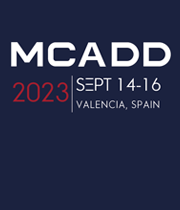MCADD 2023 _ Event Postponement
This is to inform that due to some circumstances beyond the organizer control, “International Conference on Medicinal Chemistry, Computer Aided Drug Design and Delivery” (MCADD 2023) Hybrid event during September 14-16, 2023 at Valencia, Spain has been postponed. The updated dates and venue will be displayed shortly.
Your registration can be transferred to the next edition, if you have already confirmed your participation at the event.
For further details, please contact us at medicinal-chemistry@magnusconference.com or call + 1 (702) 988 2320.
Anti-Viral and Antibiotic Drugs
Viruses are small infectious pathogens that only grow and multiply inside an organism's live cells. Viruses contain receptors that allow them to adhere to your body's healthy (host) cells. A virus can multiply after it adheres to and penetrates a host cell (make copies of itself). The virus infects additional healthy cells once the host cell dies. Antiviral drugs aid the body's defence against viruses. The medications can help to alleviate symptoms and minimise the duration of a viral illness. Antivirals also reduce the chances of contracting or spreading viruses like herpes and HIV. Antiviral medications have varying effects based on the drug and the infection. Antiviral drugs are not required for the majority of viruses to heal. Antivirals are prescribed by doctors to treat viral infections that are persistent or life-threatening.
Antibiotics are antibiotics that are used to treat bacterial infections in humans and animals. They work by either killing germs or making it difficult for them to grow and multiply. They include a variety of potent medications that are used to treat bacteria-related diseases. Antibiotics are ineffective against viral infections such as the common cold, flu, and most coughs. Only specific bacterial infections, such as strep throat, urinary tract infections, and E. coli, are treated with antibiotics. Some doctors are concerned that patients are using antibiotics excessively. They also believe that this abuse contributes to an increase in the number of bacterial illnesses that are resistant to antibiotics. Outpatient antibiotic misuse, according to the Centres for Disease Control and Prevention (CDC), is a special issue.
- Anti-Viral for COVID-19
- Drug Development
- Computational Models
- Drug Testing
- OTC Medicine
- Antimicrobial Resistance


Title : A qsar survey on tyrosine kinase inhibitors
Atefeh Hajiagha Bozorgi, Faculty of pharmacy, Iran (Islamic Republic of)
Title : Abbott diagnostics: COVID-19 inactivation, nucleocapsid antigen automated immunoassay development, and variant testing for automated and lateral flow assays binaxnow™ and panbio™
Philip M Hemken, Abbott Laboratories, United States
Title : Synthesis, antibacterial activity of 3-amino 5-methoxyl-2-methyl quinazolin-4(3H)-one an amino-6-methoxyl-2-methyl of 4H–benzo[d] [1,3]–oxazine–4–one
Osarumwense Peter Osarodion, Ondo State University of Sciences and Technology, Nigeria
Title : Tackling mycobacterium tuberculosis resistance with tailored isatin-pyrimidine hybrids enoyl acyl carrier protein reductase (Inha)
Amgad Albohy, The British University in Egypt (BUE), Egypt
Title : Transition metal complexes/Organometallic compounfs as anticancer drugs
Prakash kinthda, Nims university,jaipur,rajasthan, India
Title : New n-ribosides and n-mannosides of rhodanine derivatives with anticancer activity on leukaemia cell line: Design, synthesis, dft and molecular modelling studies
Ahmed, Kafrelsheikh University, Egypt